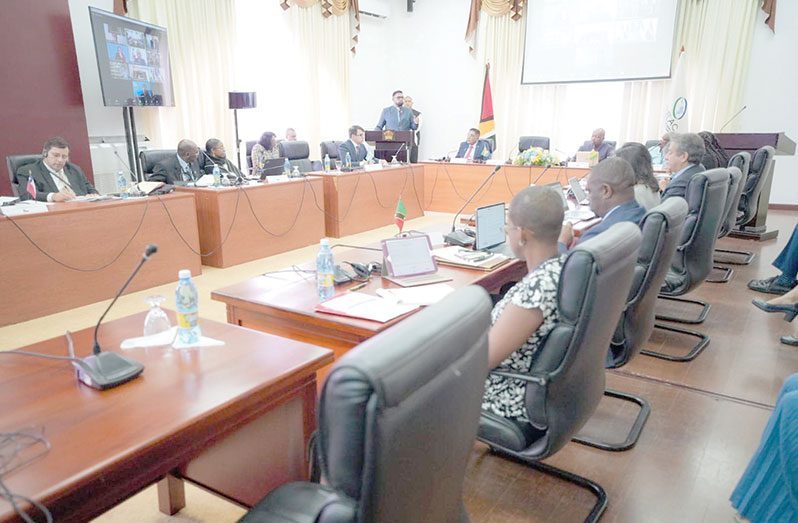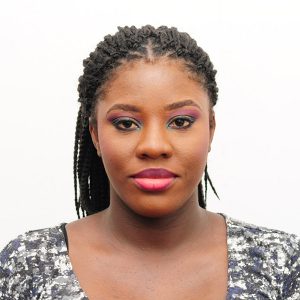–President Ali says, encourages CELAC to produce action plan to allow countries to learn from each other
PRESIDENT, Dr. Irfaan Ali on Tuesday called for a targeted approach to food security that involves the integration of the health, education, and technology sectors, along with climate change mitigation, so that food security can better enable national prosperity.
The President shared this view as he delivered the feature address at the Community of Latin American and Caribbean States (CELAC) high level Ministers of Agriculture meeting, which is being held in Guyana at the Arthur Chung Conference Centre (ACCC).
The President was making a presentation on the CARICOM 25 by 25 Food Initiative that is targeting the reduction of the Caribbean’s Food Import Bill by at least 25 per cent by 2025.
Dr. Ali emphasised that food security is about wider dynamics that involve and address more than just the issue of nutrition.
“We cannot speak about food and nutrition as if it exists as a standalone in the policy articulation and formulation of our different countries. If we attempt to do that, we’ll be doing ourselves a great injustice in this forum,” the President said.
He went on to say: “You cannot confront food security and nutritional security without confronting climate change, without confronting our education system, health system, without confronting sustainable development.
“Without confronting the sometimes unexplained disinterest from international funding agencies, commercial banks, and financial institutions when it comes to financing agriculture food security and understanding the connection between agriculture, our health security, and ultimately national security.”
According to Dr. Ali, across the CELAC member states, the health and education systems must be re-oriented to align with the culture change necessary to bring about food security.
“If we don’t have a health sector that understands the linkage between food production and food security and what they do, then we’ll have a mismatch; we will not have an alignment of policy. So, one of the outcomes of this meeting should be to outlined very clearly the role of the health sector in this equation,” he advised.
Dr. Ali called for the conference to focus on identifying existing difficulties and barriers to food security in the region, and have a very frank conversation that points to the policies, solutions and opportunities, and clearly articulate the link between food security and national prosperity in every single country.
“Once we are able to do that, I think we will have a very impactful conference and one that can feed into many other things that CELAC is looking at; one that can lead to an integrated discussion in agriculture, health and education and finance… one that puts food nutrition as central to poverty reduction and reducing inequality. That is the type of discussion that would evoke the interest we want to have,” the Head of State said.
Formed in 2010, CELAC consists of some 33 countries, and is an intergovernmental mechanism for dialogue and political agreement.
It was created with a commitment to advance the gradual process of regional integration, unity and carefully balance political, economic, social and cultural diversity of Latin America and the Caribbean, and represent, promote and protect the interests of its member states and their citizens.
It promotes an increase in regional trade, economic development, and further economic cooperation among members in order to defend their growing economies.
President Ali described CELAC as a bloc that binds together the constituting nations as one region that must focus on creating a unified family.
The President underscored the need for CELAC to produce an action plan for countries to learn from each other’s best practices, and dispose of policy and practices that are hindrances to progress.
He stressed that the time is right for the region to capitalise on the global focus that food security has been receiving over the past few years due to food availability concerns, which were brought sharply into focus by the COVID-19 pandemic from 2020 and later the Russia/Ukraine war which began in 2022.
As the world grappled with food product shortages during those crises, many small nations, particularly those that constitute CELAC, found themselves disadvantaged in the food supply process.
“We have various countries in CELAC that have the capacity to coordinate with all of us a plan in which we secure ourselves. And we need to start ensuring that the world understands that agricultures is about food production and food production is about nutrition. And food production and nutrition is about good health, and good health, and food production is about national prosperity. National prosperity is about national security because if you don’t have national prosperity, you cannot have national security. And all of this is linked back to our system and what our system feeds us,” Dr. Ali said.
The President also pointed to the need for the involvement of the research and development institutions, such as the universities, as an important part in developing solutions customised to the specific needs of the region.
“Where are the leading universities in CELAC in this discussion today? Where are the research institutions in CELAC in this discussion today? Are we incapable of developing and innovating within this region? Why can’t we have the resource agencies and universities presenting today on models and technology that is applicable to this region. Where are they?” the President questioned.




.png)









